MIT SCHOOL OF HUMANITIES, ARTS, AND SOCIAL SCIENCES
Media + Awards Digest | May 2020

The Media + Awards Digest is a section of the Said and Done newsletter. Subscribe
Office of the Dean | 14 May 2020
Dear Friends,
As we endure the coronavirus pandemic, our School and the Institute as a whole have met extraordinary challenges with great flexibility. The Institute leadership, faculty, and staff are now working diligently to determine how and when safe returns to campus will be possible, while operating in an environment that remains unpredictable.
Our School faculty are also making a major contribution by providing trustworthy information and analysis that informs policy and increases public understanding of the pandemic landscape. Countering what the World Health Organization has described as a “massive infodemic” of misinformation, the research-informed perspectives from our faculty, fellows, and graduate students are more valuable than ever. To mention just a few:
With commentaries and articles in a wide range of publications, Charles Stewart III and his colleagues in the MIT Elections Data and Science Lab continue to take a national leadership role in determining and articulating how to conduct safe, secure elections during the pandemic. Economist David Autor describes coronavirus as “an automation forcing event” in an interview with Forbes, and Daron Acemoglu is co-author of a working paper, on the health and economic outcomes of “targeted lockdowns,” which was featured in The Wall Street Journal. Foreign policy observations and essays by political scientists Adam Berinsky, Rachel Esplin Odell, Meicen Sun, M. Taylor Fravel, and Vipin Narang appear in several widely read publications including The New York Times and The Washington Post.
Pieces exploring the pandemic’s impacts on daily life include a meditation on the neighborly public/private space of balconies in The New York Times by Bernardo Zacka, a commentary on physicality and personal identity in The New Statesman by philosopher Keiran Setiya, and an article in The Boston Globe on the privacy concerns about contact tracing by research fellow Anil Ananthaswamy. Economist Jonathan Gruber appeared on ABC News, NPR, and WGBH Boston Public Radio to address various healthcare issues, including health insurance during the pandemic. Justin Reich was also interviewed by Boston Public Radio to discuss the challenges of remote education in school districts with fewer resources.
Finally, I note with pleasure that as part of their series on students, NBC Boston profiled senior Steven Truong, one of our “MIT bilinguals,” who will graduate this month with degrees in both writing (CMS/W) and biological engineering.
For Steven and several thousand other MIT students, this anomalous spring term will soon culminate in a virtual Commencement event on May 29. We will deeply miss being together on campus for Commencement. But, as President Reif says, this year’s virtual event has been designed, in the best MIT spirit, with reinvented rituals to honor and celebrate our graduating students while also keeping the community safe.
And, whether it takes place virtually, in physical presence, in collective cheers, or quiet inner realizations, commencement from MIT is an extraordinary moment in the lives of our students, their families, and all of us involved as educators. I very much look forward to sharing this year’s historic MIT Commencement with all of you — and with the larger MIT community around the globe.
Very best wishes,
Melissa
Melissa Nobles
Kenan Sahin Dean
Professor of Political Science
MIT School of Humanities, Arts, and Social Sciences
HONORS AND AWARDS
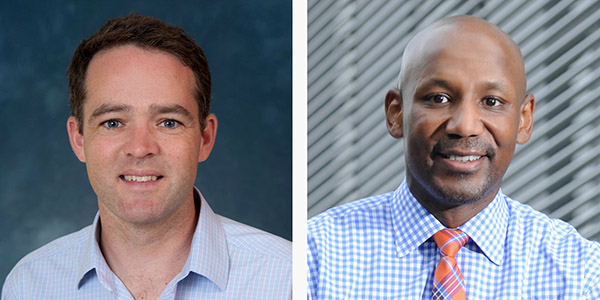
Dave L. Donaldson, Professor of Economics; Craig Steven Wilder, Barton L. Weller Professor of History; Wilder photo by Richard Howard
ECONOMICS + HISTORY
Craig Wilder & Dave Donaldson elected to the American Academy of Arts and Sciences
Wilder joins Harriet Ritvo, Philip Khoury, and Peter Perdue as members of the MIT History faculty elected to the Academy. Donaldson joins Parag Pathak, Nancy Rose, and Iván Werning as members of the MIT Department of Economics who are members of the Academy.
Story at MIT News
ECONOMICS
Abhijit Banerjee elected to National Academy of Sciences
Banerjee’s scholarship emphasizes the importance of field work in antipoverty initiatives, in order to recreate the precision of randomized controlled trials (RCTs) and laboratory-style data within the complexity of ever-evolving social realities.
Story at MIT News | NAS announcement
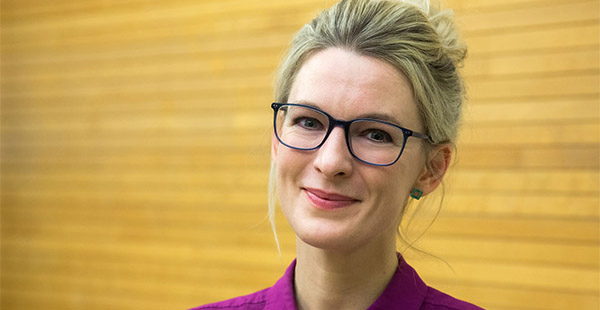
Amy Moran-Thomas, Hayes Career Development Associate Professor of Anthropology; photo, Jon Sachs
ANTHROPOLOGY
Amy Moran-Thomas receives 2020 Levitan Prize in the Humanities
Prize will support research on the cultural dimensions of climate denialism. Beyond the hyper-rational debates of 'jobs vs. environment' — and based on her own family heritage and home territory — Moran-Thomas illuminates "the cultural underpinnings that have allowed anti-science propaganda to gain traction in America and continue in the face of mounting evidence."
Story by SHASS Communications
GLOBAL LANGUAGES
Miriam Wahid '21 wins first place in de Courtivron Writing Prize
The prize is awarded annually to recognize high-quality undergraduate writing (creative or expository) on topics related to immigrant, diaspora, bicultural, bilingual, and/or mixed-race experiences. Elaine Wen '23 is awarded second place, and three others earn honorable mention.
More information + read the winning entries
PANDEMIC RELATED PUBLICATIONS
COLLECTED MEDIA PUBLICATIONS
![]()
At-A-Glance List of Pandemic-related Media Publications from MIT SHASS
An ongoing list of commentaries from our School community to inform policy and to increase public understanding of the pandemic.
Collected Publications
CIVIC PERSPECTIVES AND DAILY LIFE

detail, illustration by Maria Meden, The New York Times
THE NEW YORK TIMES
An ode to the humble balcony | Bernardo Zacka
In an opinion piece for The New York Times, Zacka weighs the particular private/pubic balance of having a balcony during Covid-19: "It is private, yet public; exposed, yet secluded. It offers company without the demands of intimacy, and we should never take it for granted again."
Opinion at The New York Times
THE NEW STATESMAN
What the pandemic tells us about personal identity | Kieran Setiya
"We have become more used to seeing others through screens and software, but we are embodied beings and digital communication can feel lacking. What effect will this have on us?"
Commentary at The New Statesman
THE BOSTON GLOBE
The tension between privacy and the coronavirus | Anil Ananthaswamy
Ananthaswamy, a Knight Science Journalism research fellow at MIT, writes, "We have to ensure that contact-tracing methods that compromise our privacy don’t become the norm in the quest for short-term relief from the pandemic."
Commentary at The Boston Globe
ELECTION 2020
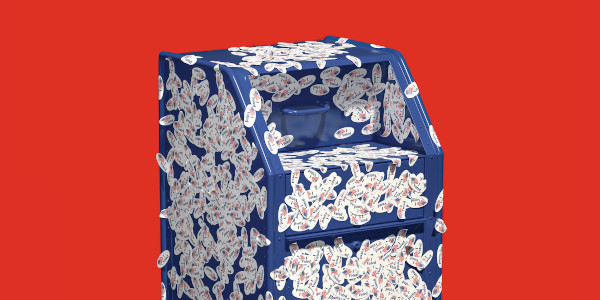
Illustration by Pablo Delcan and Lisa Sheehan for The New York Times
VOX
Many world leaders have seen double-digit polling surges | Adam Berinsky
“If there's any president I would expect no rally effect for, it would be Trump,” said Berinsky, a political scientist at MIT whose research focuses on public opinion during wartime.”
Story at Vox
THE NEW YORK TIMES MAGAZINE
Will Americans lose their right to vote in the pandemic? | Charles Stewart
Researchers have found that vote-by-mail hasn't obviously helped one party or the other. Nationwide, about the same share of Republicans and Democrats voted by mail in 2016.
Story at The New York Times Magazine
Related: 14 urgent recommendations for safe 2020 elections
THE NEW YORK TIMES
Can Democrats avoid Trump's China trap? | Rachel Esplin Odell
Odell, a PhD candidate in political science, writes, "Going abroad in search of monsters to destroy won't save Americans from pandemics, but it does risk entangling the United States in a cold war with the world’s No. 2 power."
Commentary at The New York Times
HEALTHCARE
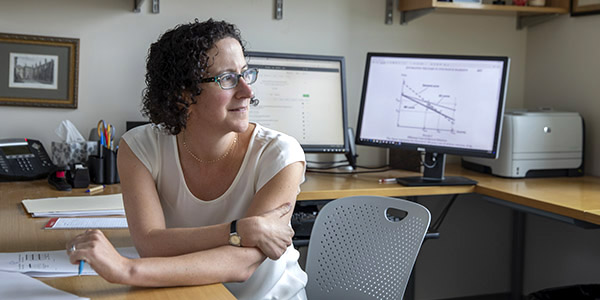
Amy Finkelstein, John and Jennie S. MacDonald Professor of Economics; photo courtesy of the MacArthur Foundation
MIT TECHNOLOGY REVIEW
Amy Finkelstein has changed what we know about the economics of health care—and medical care itself
Finkelstein, the John and Jennie S. MacDonald Professor of Economics, is a leading health economist and spends a significant amount of her time looking for new ideas and data.
Profile at MIT Technology Review
ABC NEWS
Can the economy recover in parts of the country as early as May 2020? (No.)
In an interview with ABC News, professor of economics Jonathan Gruber discusses the benefits of the stimulus package, and says that social distancing and economic measures “won’t end until we have a vaccine.”
Commentary at ABC News
NPR
How to cover millions who lost their jobs and health insurance | Jonathon Gruber
A recent estimate suggests the pandemic has cost more than 9 million Americans both their jobs and their health insurance. "Those numbers are just going to go up," Gruber said. "We've never seen such a dramatic increase in such a short period of time."
Story at NPR
WGBH
"Nightmare" situation for nation's nursing homes | Jonathon Gruber
Gruber warns that, tragically, patient deaths may only be the beginning of woes for America's nursing home industry. On Wednesday, Gruber joined Boston Public Radio to explain longstanding issues with how U.S. nursing homes are funded, and how the current health crisis is exacerbating those problems and putting the entire system at risk.
Commentary at WGBH
QUARTZ
Is there really no community transmission of coronavirus in India? | David Kaiser
Kaiser writes, "While this is comforting news, it is prone to misinterpretation. The problem these studies face is that, with low rates of testing, there is a high chance of not finding Covid-19 in the community even if it is there."
Full commentary at Quartz
ECONOMIC IMPACTS
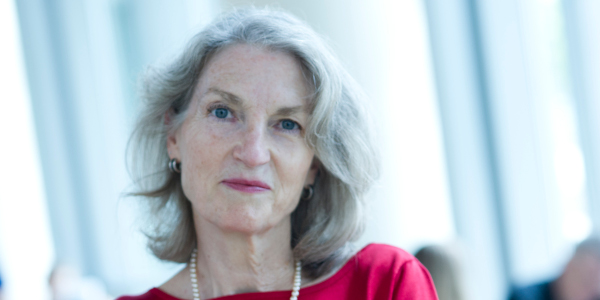
Kathleen Thelen, Ford Professor of Political Science; photo by Stuart Darsch
THE WASHINGTON POST
Europe has kept down pandemic unemployment — unlike the U.S. | Kathleen Thelen
"Congress's new bill will add more funds, but the problem goes deeper. To understand what is going on, it's helpful to understand how European governments approach the same problem: through 'short time work' (STW) policies."
Commentary at The Washington Post
THE GUARDIAN
Coronavirus is a crisis for the developing world | Esther Duflo, Abhijit Banerjee
The two Nobel laureates write, "The systematic testing strategies that have been crucial to containing the epidemic and easing lockdown measures in Europe are equally critical in poor countries."
Commentary at The Guardian
THE WALL STREET JOURNAL
Targeted lockdowns are better | Daron Acemoglu, Iván Werning
That conclusion comes in a new working paper from the National Bureau of Economic Research by MIT economists Daron Acemoglu, Victor Chernozhukov, Iván Werning and Michael Whinston. The authors compared relative risks of infection, hospitalization and death for the young, the middle-aged and those over age 65.
Story at The Wall Street Journal | PDF of the paper
FORBES
Covid-19 may become "an automation forcing event" | David Autor
Already, there are indications that this downturn may trigger more fundamental shifts than a normal recession. Some economists estimate that more than 40 percent of recent layoffs could become permanent. Autor, a leading economics professor at MIT and co-chair of the university's Work of the Future Task Force, has called the Covid-19 crisis an “automation forcing event” that will fundamentally transform the economy.
Story at Forbes
VOX
India takes a small step toward relaxing its strict lockdown | Ahbijit Banerjee
Banerjee, a Nobel Prize-winning economist at MIT, has criticized the government for not spending enough money to provide relief to the poor. Roughly 70 million people in India live in extreme poverty — living on under $2 a day. “I know there's a concern that what is the use of giving money to people when the markets are closed. But, to begin with, you can tell people that money is coming and create a mood for demand."
Story at Vox
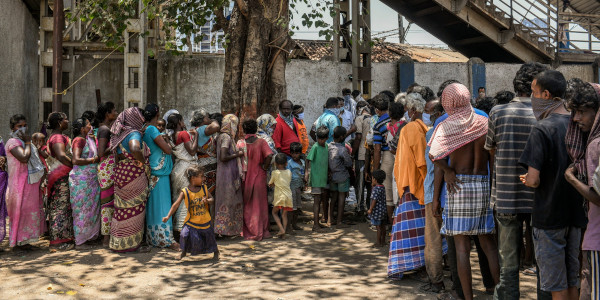
Migrant workers stuck in Mumbai lockdown lining up for food; photo by Atul Loke for The New York Times
THE NEW YORK TIMES
Millions had risen out of poverty. Coronavirus is pulling them back. | Ahbijit Banerjee
“These stories, of women entering the workplace and bringing their families out of poverty, of programs lifting the trajectories of families, those stories will be easy to destroy,” said Banerjee. “There will be groups of people who climbed up the ladder and will now fall back."
Story at The New York Times
INNOVATION HUB - PRI
The economics of a global emergency | David Autor
When it comes to what happens next, nothing is certain. According to Autor the recession ultimately could be “transformative” for the country's economy — both positively and negatively — but this type of crash is almost unprecedented. “We can't be super confident in the projections that we typically use.”
Story at PRI's Innovation Hub
EDUCATION
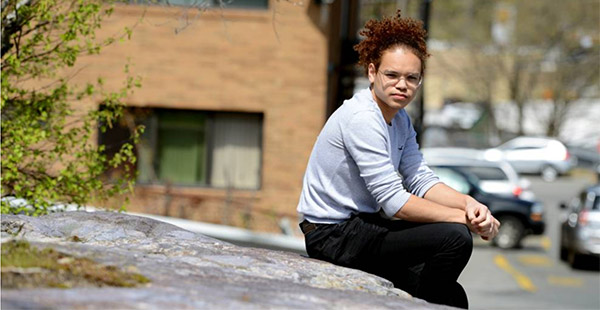
Carlos Prudencio, 16, a sophomore at Lynn English High School, sits for a portrait outside his home in Lynn, Mass., on May 5, 2020. Photo by Meredith Nierman, WGBH News
WGBH
Remote learning a challenge, especially in districts with fewer resources | Justin Reich
Reich, of the Teaching Systems Lab at the Massachusetts Institute of Technology, said teachers also are being asked to work differently during the pandemic. “For the most part, it's not the case that we're asking teachers any longer to directly teach their students remotely,” Reich said. “There's not enough time for that connection."
Story at WGBH
EDUCATIONAL LEADERSHIP
Keep it simple, schools | Justin Reich
Reich writes on a path forward for education in a time of social isolation: "To ensure equity and engagement in remote learning, schools need to zero in on key priorities, including enrichment and manageable projects."
Commentary at Educational Leadership
NBC BOSTON
MIT senior Steven Truong reflects while completing spring semester
Steven Truong is a senior at the Massachusetts Institute of Technology studying biological engineering and creative writing. Since moving to remote learning he says one challenge he has had is helping his mother with unemployment paperwork.
Interview at NBC
INTERNATIONAL IMPACTS

Chinese President Xi Jinping speaks after reviewing the Chinese People's Liberation Army Navy; photo by Li Gang/Xinhua/AP
NPR
China lifts lockdown, but strict controls still curb residents | Meicen Sun
Meicen Sun is a PhD student at MIT, where she serves on the Work of the Future task force. Each city or province, she says, commissioned its own version of this rudimentary digital contact tracing system, so there are now some 200 overlapping apps.
Interview at NPR
THE WASHINGTON POST
Does the global pandemic open new opportunities for Beijing? | M. Taylor Fravel
"A number of recent analyses have emphasized that China is seizing pandemic-created opportunities to improve its position in the South China Sea as other countries are distracted or otherwise unable to respond. A key implication of such claims is that absent the pandemic, China would have acted differently and perhaps with more restraint."
Commentary at The Washington Post
ASSOCIATED PRESS
Outsiders consider possibility of chaos in North Korea | Vipin Narang
“The million-dollar question is: When do you invoke the OPLAN and what indicators do you rely on to do so? Because one country's ‘securing the country' operation can look to the other nation like an ‘invasion plan.' And then all hell can break loose,” said Narang.
Story at the Associated Press
The Media + Awards Digest is a section
of Said and Done, the School's online digest.
EXPLORE
Follow us




Subscribe to Said and Done
10 issues a year
Research
Impact
MIT SHASS Research + Perspectives for the Pandemic
Website
Solving Climate: Humanistic Perspectives from MIT
Browse the Series
Ethics, Computing, and AI: Perspectives from MIT
Browse the Series
Computing and AI: Humanistic Perspectives from MIT
Browse the Series
MIT Climate website | Humanistic research
A major source of research, innovation, and discussion
Join us!
SHASS on MIT News
Research and Features
MIT Campaign for a Better World
Story | Join Us

Published by SHASS Communications
Office of the Dean, MIT School of Humanities, Arts, and Social Sciences
Editor and Designer: Emily Hiestand
Publication Associate: Alison Lanier
Media Relations Manager: Stephen Oakes
Published 13 May 2020